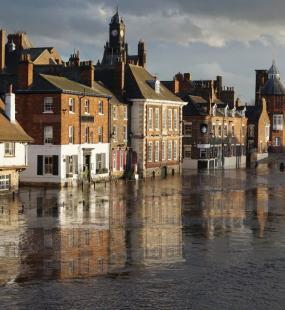Seven common causes of business interruption
Published
Written by
Read time
The phrase “business interruption” is not unusual, but they’re not two words anyone involved in a commercial operation wants to hear – or deal with. It’s like “rain stops play” being announced at a major sporting event, only with more serious consequences. But to truly mitigate any consequences caused by many types of business interruption, we must first understand what triggers it, as well as the importance and protection provided by taking out specific business interruption insurance.

Fire and explosion
Fire remains a major cause of having to make a business interruption claim. This could start with a stove in a kitchen, caused by faulty electrical equipment, or combustible dust and materials catching alight. Flammable liquids and chemicals are also often a reason for a blaze. The word ‘explosion’ may seem a little dramatic, but rather than something rare like a deliberate act of terrorism (which is excluded from standard business interruption insurance policy cover anyway), it may be a standard piece of IT equipment or a kitchen microwave that causes an incident that means you have to temporarily shut down part or all of your business.
Water damage
Ingress of water, or escape of water, can cover anything from a burst pipe to a major flooding issue due to adverse weather conditions. And not only is it a common cause of business interruption, but the break in services can have long-term repercussions. Water damage may also be caused if business premises have been unoccupied or unchecked for some time, and a leak has occurred. The consequences of water damage may mean that electrical or mechanical equipment is damaged beyond repair, and offices or shops may not be fit for purpose. It can also ruin large amounts of stock. You may need to relocate for a while, orders and work may be interrupted due to mechanical problems, and orders might be unfulfilled. All of these issues would be far less severe with business interruption insurance in place – and in this case, we’d recommended specialised flood risk cover.
Cyber incidents
Carrying just as much destructive power as a lightning bolt, a cyber incident or crime is one of the fastest-growing reasons for business interruption. From a computer virus that can bring down extensive networks, to the data of thousands of customers being compromised, a cyber incident may leave few “scene of crime” traces, but the damage is often extensive – financially, operationally, and reputationally. And while it tends to be the larger organisations that make for headline news (health and financial records being infiltrated and shared), smaller companies may find themselves the victim of phishing scams or malware attacks, lost or stolen hardware and devices, as well as digital identity theft. Recovery and restoration from cyber incidents may be lengthy unless you have a business interruption policy that helps you get back on your digital feet. In addition, in today’s climate where the next type of cybercrime is only a device tap away, we recommend that you also consider a specific cyber insurance policy.
Supplier failure
While some of the worst breaks in the supply chain were during the pandemic, several global events mean that supplier failure, or at the very least delays, is a constant source of anxiety for many businesses. War almost always affects trade routes, and sometimes resources are the bargaining chips in a conflict. The same is true of natural disasters that may occur in a region where you source supplies. For example, if you import cereal grains from Asia, damage caused by famine, drought, heavy rain, and hurricanes in this region can severely impact you getting these products on the shop shelves, which also has a knock-on effect on profit margins.
Natural disasters
Following on from the above, natural catastrophes are not just the domain of countries and places far away. Global warming and changes to climate mean that here in the UK we need robust contingency plans as well. Hurricanes, high winds, severe storms, typhoons, and fires activated by weather conditions rather than malicious intent, are just some of the ways a disaster can hinder your business in the immediate aftermath, rather than the knock-on effect of a broken supply chain. If a forest or field fire spread and caused damage to your shop or offices; if a storm removed the roof of your factory; and if a hurricane not only took away that roof but shut down power and utility supplies, then that would mean your business would be unable to continue until at least some of these issues were fixed.
IT outages and power failures
We’ve all experienced those days, weeks, or months when a network goes down, a Wi-Fi provider is disabled, or a computer system simply fails to do its job. But the consequences of even the shortest of interruptions in this category may be long-lasting and damaging. If your income is reliant on having good Wi-Fi and network access, and if transactions get lost in cyberspace because of a power failure, or if you and your employees can’t complete an urgent job that is reliant on an IT system, then this is a very good case for claiming business interruption.
Machine and equipment failure
While this has been referred to earlier on our list, machine and equipment failure as a cause of business interruption is often a standalone cause. Mechanical breakdown after all is rarely caused by floods or other disasters but may well bring your manufacturing process to a halt. Large-scale printers, conveyor belts, delivery vehicles… if any or all of these are inoperable, that means unwanted downtime. There will be an impact on production deadlines, invoices paid, and work for employees.
While the above list covers the most cited, there are a few other causes of business interruption that are worth mentioning. Transport interruptions and delays, which may be due to strikes (a cause all on its own!), problems on the rails, seas, airlines or roads, a further pandemic, or even a talent drain when a larger than expected group of staff all leave at the same time taking their skills and knowledge with them. And if a major customer of your own experienced a business interruption, which meant you couldn’t distribute your own product in a timely fashion, this may result in a business interruption scenario for your own enterprise. Finally, there could be ‘denial of access’ issues, for example, a road leading to your business which is forcibly closed by public services for safety concerns. Although rare, this could be a result of crime, public safety or due to catastrophes in neighbouring properties.
The main things a business interruption insurance policy should cover
Before we leave the topic of business interruption causes, here’s a quick list of what should be covered when you sensibly decide to arrange a business interruption insurance policy:
- Business interruption insurance is designed to financially support you until you’re operating as if the insured event had never happened. For this reason, you need to make sure the period of support is long enough. We call this the indemnity period. It’s critical to get this right to ensure the financial support doesn’t stop too early.
- Any shortfall in finances and profits proven to be lost to business interruption – this can cover damaged or lost stock, office equipment, repairs, rebuilds, and many other elements of replacement
- Reimbursement of any extra operational expenses as a result of the event, such as additional accountants’ fees, legal expenses, and surveyor outgoings
- Fixed costs which mean any operating costs still being incurred by the property, even if you cannot trade in it – such as employees’ wages
- Temporary location – some policies cover the added expenses of relocating to and operating from temporary new premises, although please do check whether you’re covered for this under your building insurance policy
- Closure by a civil authority – if the Government rules that a business needs to close the premises, such as the circumstances of the pandemic, business interruption insurance can cover the loss of revenue incurred
You may be running a very small family business, such as a market stall, or perhaps you’re the COO of a global corporation. The scale may be very different, but the chance of a business interruption incident is still there. If you don’t already have a related policy, do have one but are weighing up the value, or want to ensure your business interruption policy is watertight, speak to one of our specialists today at 0330 008 1334 or click here for a quote.

